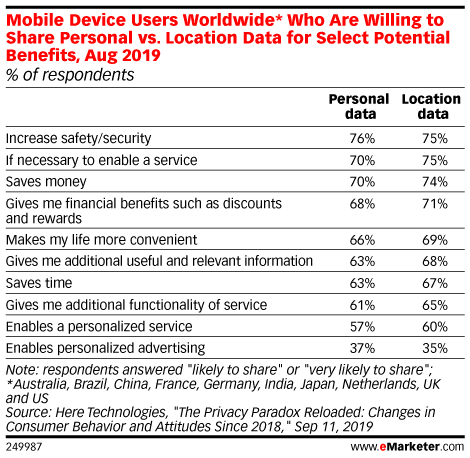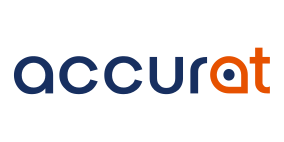Accurat offers location based intelligence solutions for retail brands, publishers and media companies. The benefits of the solution from a B2B point of view are clear. As permissions (both GDPR consent and a technical mobile OS permission) are required, the user benefit needs to be crystal clear in order to convince app users to opt in.
This document aims to give an overview of different categories of potential use cases that are often used to convince the user.
Potential location based use cases
Below an overview of different categories of use cases are outlined. For some apps, one use case is sufficient to have users opt in, for other brands the combination of different use cases is required. The Accurat team is ready to guide you through the process of identifying the right benefits for your users.
Before we dive into the different possibilities, the graph below (source: eMarketer.com) indicates the willingness of US respondents to share personal data or location data for specific use cases. Summarized: users are willing to share location data for multiple benefits equally as much as other personal data.

A. “Never miss a benefit”
Often used by retail, QSR & loyalty programs.
To offer a coupon, a reminder of a temporary sale or reminding the newest collection has landed in stores is the easiest location-based benefit for most apps and its app users. Loyal customers opt in to receive message when they are nearby a store, on a shopping trip or via our behavioural based triggers such as “heading for lunch”.
B. Better content & ads
Often used by publishers & content rich apps.
Real-world behaviour profiling based on a user’s whereabouts, unlocks insights for over 20 categories, calculates loyalty parameters such as frequency, churn for 600+ brands and provides behavioural insights about a user’s leisure, commuting or even professional preferences.
It is the best source for optimizing both content and ads as a publisher. Highlighting this benefit is best supported with clear examples (“we sort content based on your location and preferences like favourite stores, your leisure preferences like your favourite soccer club etc.”) and by highlighting the alternative (“You receive an equal amount of ads, but they are not tailored to your profile”).
Offering offline benefits to users, provided by advertisers when near their stores, is already offered by international publishers as an additional service to both users and advertisers.
C. Location based services
Often used by retail and service apps & publishers.
A weather service, regional news or other reminders or services based on requiring a user's exact location form authentic reasons to capture and use location data on an 'always' permission level. The promise of a personal reminder in which location is required (traffic jams, stormy weather, roadblocks, new store opened, regional alert, ...) is considered a valid reason to share data.
D. Service benefits
Often used by retailers, service, flights & automotive apps.
Knowing the location offers the possibility to tailor the experience of the user and improve your service. Instore service could be augmented by putting local benefits on top or by showing a floorplan for department stores, putting the loyalty card on top or offer a “ask for help” button for example.
A service focused app like a real estate or second hand app can remind people of relevant properties or second hand deals based on previous search behaviour.
Service-heavy industries like automotive or airlines have multiple touchpoints that offer potential for location-triggered solutions: time to leave for a X minute drive, head for line A, let’s grab a coffee you’ve plenty of time, ready to head for the gate…
E. Local experience improvement
Often used by event, retail, hospitality and QSR apps.
Our unique approach of using building shaped polygon geofences we have higher accuracy of knowing where your app users are. This information helps to make a difference between far away, nearby (out of store) or instore messages.
Far away: put nearby locations on top, offer a route description, show instore stock or sales first in your app
Nearby: remind of a new collection, offer a clear benefit or remind about a user’s loyalty balance to trigger nearby visitors
Inside: put the mentioned benefit on top or improve the inside experience by showing a floorplan for department stores, putting the loyalty card on top, “unlock” the “ask for help” or “order now” button or put the menu and deals on the landing page
Given instore beacons or wifi is provided in your location, it is possible to connect the signals to the Accurat solution to optimize the instore benefits even more.
F. Incentivized / marketing benefit
Often used by retail, QSR & brand apps.
In some cases, offering a benefit or incentivize the location based consent, can help to boost the adoption. Smart creative ideas can focus on actual user behaviour to come up with relevant benefits.
Stores offering flowers could launch a “surprise the misses” reminder service that helps to remember the “buy flowers for your wife” on special occassions like mothers’ day, on her birthday or triggered when one is close by as a “surprise her” reminder.
Movie theaters could add a “historic movie locations” feed that triggers movie clips when a user is nearby a famous movie location.
A (literal) “bargain hunt game” could incentivize users to visit multiple stores over time to unlock benefits.
G. Social benefits
Often used by venue & event apps.
Another category of benefits is to offer “social benefits”, linked to a users’ network.
Sharing the location of friends or remind people of popular places of friends when they are nearby is something that could work for a tourism app. Venues like movie theaters or bars could have a “friends that are near” option or event apps could offer a matchmaking tool of relevant nearby peers on a conference floor or “must see expo boots”.
This benefit is often harder to offer as it expects friends to have the app as well, but could be relevant for the larger user base apps.
H. Location as a catalyst
Often used for purposes such as recommender systems.
Finally, historic location knowledge of a user is proven to be a relevant parameter for optimizing recommendation algorithms. Even for the movie industry, multiple papers suggest movie recommendations would strongly improve if the offline user behaviour is better understood.
Optimizing benefits if you are a department store, a large mall or even an offline e-tailer with multiple categories. Knowing the profile based on historic behaviour allows to tailor the experience strongly. In-app and across channels as the Accurat data can be easily shared across devices.


